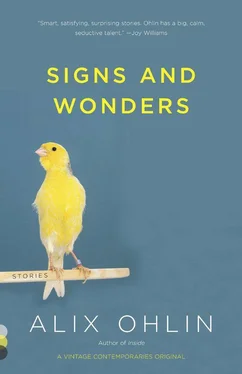Alix Ohlin - Signs and Wonders
Здесь есть возможность читать онлайн «Alix Ohlin - Signs and Wonders» весь текст электронной книги совершенно бесплатно (целиком полную версию без сокращений). В некоторых случаях можно слушать аудио, скачать через торрент в формате fb2 и присутствует краткое содержание. Год выпуска: 2012, ISBN: 2012, Издательство: Random House, Inc., Жанр: Современная проза, на английском языке. Описание произведения, (предисловие) а так же отзывы посетителей доступны на портале библиотеки ЛибКат.
- Название:Signs and Wonders
- Автор:
- Издательство:Random House, Inc.
- Жанр:
- Год:2012
- ISBN:9780307948649
- Рейтинг книги:3 / 5. Голосов: 1
-
Избранное:Добавить в избранное
- Отзывы:
-
Ваша оценка:
- 60
- 1
- 2
- 3
- 4
- 5
Signs and Wonders: краткое содержание, описание и аннотация
Предлагаем к чтению аннотацию, описание, краткое содержание или предисловие (зависит от того, что написал сам автор книги «Signs and Wonders»). Если вы не нашли необходимую информацию о книге — напишите в комментариях, мы постараемся отыскать её.
Signs and Wonders — читать онлайн бесплатно полную книгу (весь текст) целиком
Ниже представлен текст книги, разбитый по страницам. Система сохранения места последней прочитанной страницы, позволяет с удобством читать онлайн бесплатно книгу «Signs and Wonders», без необходимости каждый раз заново искать на чём Вы остановились. Поставьте закладку, и сможете в любой момент перейти на страницу, на которой закончили чтение.
Интервал:
Закладка:
She’d kept the news of the accident from Steve at first, because she was afraid of what might happen to his recovery if he were shaken too badly. The twelve steps were his only navigational tool through the world, and she didn’t entirely believe they’d keep him on course. And indeed, when he came, he was a mess — red eyed, ashen. He was six foot four and two hundred pounds, her son, yet still managed to be the most fragile human being Kathleen had ever known. No wonder he’d been drawn to turtles; he too should’ve been born with a shell. Overly sensitive to the world, he had had to swathe himself with drugs so as not to feel it too much. Now, sober, he was unsheltered, exposed. One look at his father and he burst into tears, shuddering against Kathleen, his spine curling. If he could feasibly have crawled into her lap, she knew he would’ve done so. Cradling his huge shoulders in her arms, Kathleen cried too. His grief was the knife that sliced through her own numb skin.
“It’s going to be okay,” she murmured to him, over and over.
“It is?” Steve said wildly. “How? When?”
“We just have to wait,” she said. “It’s a waiting game.”
He wanted to know if he should put off his move to California, to the better zoo with more kinds of turtles. She forbade it. She told him Terry would want him to go. Which, if he had any brain activity inside the sleeping carapace of his body, he did.
The car was recovered in a wooded area off the interstate. Its windows had been left open, and the interior was colonized by raccoons — Terry had thought that patronizing McDonald’s made him a man of the people — and soaked by rain. As a crime scene, it was less than pristine. Because the pterodactyl-seeing man had been wearing a ski mask; because the sole witness, the guy at the hospital, had been drinking; and because even violent crimes are just passing deeds in a world overflowing with them, the carjacking case did not get solved. At first the police called Kathleen regularly; she went to the station, reports were filed. Gradually she found herself calling them; eventually they stopped returning her calls. At night she sometimes dreamed of the hallucinating carjacker, and he was always riding the pterodactyl, hanging on to its leathery neck, laughing as it flew him up and away.
Steve loaded his possessions into a U-Haul and drove west, calling every day, then every other day, to report on his progress and new life. Her departmental colleagues, initially so solicitous, stopped visiting, and then their calls dropped off too. “End of the semester,” they said apologetically. “You know how crazy it gets.”
She was left alone with the breathing, silent body of her at-one-time-soon-to-be-ex-husband.
Only one person, of everyone she knew in the world, didn’t seem to forget her, and this, horrifyingly, was Fleur Mason. She’d been part of the first departmental visit, and in that flurry of conversation Kathleen had been able to ignore her, though she suspected her of having left behind the white teddy bear holding a mug that read Get well soon! But she was unavoidable when she came alone, a week later, with a box of chocolates and basket of specialty teas. She stood next to the bed and said cheerfully, “He doesn’t look so bad, does he? I think he looks better than last week.”
Kathleen missed her job, her students, her son, and, most of all, the sense of a future without constant irritation opening up before her, a future that — like Tantalus and his grapes — seemed to have been ripped away just as she was about to grab it. But of everything she’d gone through, being alone with Fleur Mason in a hospital seemed the most intolerable. And while she’d realized that her irritation was merely a substitute for other hatreds, that didn’t mean she liked the woman any better. She still found her presence, her clothing, her voice, her manner — in short, her— as intensely aggravating as before.
So she didn’t say much when Fleur showed up, just glared — figuring it was her prerogative to be rude. And she also figured that it was better to discourage Fleur now, based on the same principle she used as a strict, even harsh grader on the first paper of the semester, so the students would know she wasn’t a pushover.
If Fleur got the message, she didn’t show it. She cocked her head and spoke in a high, chirping voice apparently meant to be sympathetic. “You’ll get through this, Kathleen,” she said. “I know you will. You’re a very strong woman, and you’ll prevail.”
Kathleen said, “Whatever happened to that bird of yours? Did anybody ever figure out who took it?”
“Um, no,” Fleur said, clearly rattled. She looked down at the ground and fiddled with the fringed edges of her beaded, ruffled scarf.
“Maybe no one took it,” Kathleen said. “Maybe it just escaped.”
Fleur was looking at Terence now, at the cage of his body. If Kathleen wasn’t mistaken, there were tears in her eyes. “Stranger things have happened,” she said.
Each week, Fleur came back. Sometimes she came to the hospital, during visiting hours, but more often, as time dragged on, she came to the house, dropping in on Kathleen on Thursday afternoons after classes were over. She brought a book, or brownies, or departmental gossip, and also, sadly, she brought the annoying gift of her personality and her chortling, exasperating laugh.
Kathleen made no attempt to be polite; she never offered coffee or tea, or even thanked her for coming by. Fleur took to bringing coffee with her, in a thermos, and separately packed containers of milk and sugar, along with cookies that she arranged on a floral plate. Which she also brought. She was a portable concession, a coffee-shop-mobile.
She rarely asked about Terry, seeming to assume that if there was news on that front, Kathleen would tell her. Rather, she asked about Kathleen’s week, what she’d been doing, as if she had a life. And because Kathleen was proud, she found herself anticipating this question throughout the week and then developing a life in order to have an answer. She read books, knitted a scarf, watched a documentary film about turtles so that she could understand her son’s job better. These things weren’t much, but they were better than nothing, and in Fleur’s presence she offered them to herself.
Fleur days, as she thought of them, gave her weeks their only shape. Otherwise she separated the days into mornings, which she spent at home, afternoons, spent with Terry, and evenings, with a bottle of wine. Each day was distinguished from the next only by the shift rotations of the hospital staff, all of whom she came to know by name. She asked after their kids and helped them celebrate their birthdays by eating sheet cake in the lounge.
Alone with Terry every afternoon, she played Shakespeare for him and read. She rarely spoke to him. The doctors had told her that the sound of her voice might help, but reading to him would have felt too much like pretending. She sat with him. She watched as they changed his catheter, his bandages. His skin was healing, and day by day he looked less like bruised fruit and more like supermarket poultry, naked and trussed up.
Inside the hard container of his skull, his brain was also trying to heal, she imagined, pulsing gently as it rifled through useless things — childhood memories, sports scores, Marxist theory — in search of some pure cells that would bring him back to life.
It was entirely possible, the doctors said, that he might never wake up. They spoke in measured tones of percentages and possibilities. She needed, they said, to be prepared for every eventuality. But when she pressed them for details — When do I decide? To do what? And how will I know? — they shook their heads and counseled patience.
Читать дальшеИнтервал:
Закладка:
Похожие книги на «Signs and Wonders»
Представляем Вашему вниманию похожие книги на «Signs and Wonders» списком для выбора. Мы отобрали схожую по названию и смыслу литературу в надежде предоставить читателям больше вариантов отыскать новые, интересные, ещё непрочитанные произведения.
Обсуждение, отзывы о книге «Signs and Wonders» и просто собственные мнения читателей. Оставьте ваши комментарии, напишите, что Вы думаете о произведении, его смысле или главных героях. Укажите что конкретно понравилось, а что нет, и почему Вы так считаете.












